Resin-bound gravel offers good grip when properly installed, though it can become slippery without the right preparation. Anti-slip additives, much like those used on swimming pool surrounds, are crucial for safety. The choice of stone matters too – angular aggregates provide better traction than smooth pebbles, particularly during British wet weather. Think of it like choosing trainers with proper treads rather than smooth soles.
Regular maintenance is essential. Just as you'd sweep your patio, keeping the surface clean prevents moss build-up and maintains grip. A quick inspection every few months helps spot any worn patches that might need attention, especially in high-traffic areas like paths and driveways.
Want the safest possible surface? Ensure professional installation and opt for UK-approved aggregate blends suitable for our climate.
Key Takeaways
Resin-bound gravel offers good grip in most conditions, though wet weather can make it slicker – much like any paved surface. Adding anti-slip materials during installation sorts this issue nicely.
Getting the groundwork right is crucial. A properly prepared sub-base prevents water from collecting and makes slopes safer to walk on, similar to how a well-laid garden path drains properly.
Sharp, angular stones provide better grip than smooth pebbles – think of the difference between walking on rounded beach stones versus crushed gravel. This extra grip makes a real difference in everyday use.
Monthly checks and regular sweeping keep the surface safe. It's worth giving it a good clean when you spot leaves or moss building up, as these can become slippery hazards.
Using qualified fitters is a must. They'll follow British standards and get the mix right, ensuring your surface stays safe for years to come. Think of it like getting a qualified electrician rather than doing it yourself – it's worth the investment for peace of mind.
Understanding Resin-Bound Gravel Composition
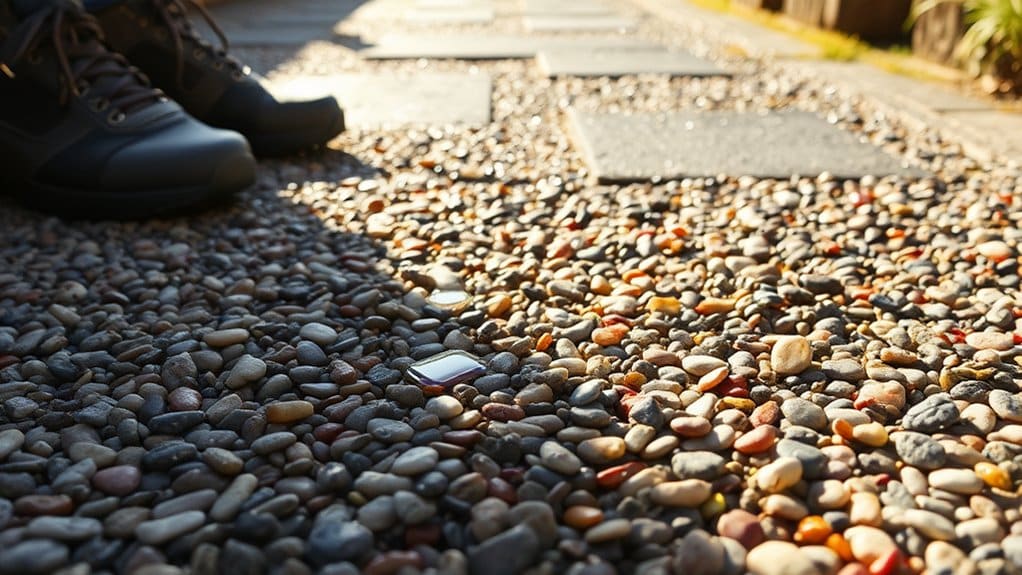
Resin-bound gravel combines UV-stable resin with selected stones to create a tough, good-looking surface for driveways and paths. The mix uses three parts stone to one part resin – rather like mixing concrete but with different materials. The stones provide the look and strength, whilst the resin holds everything firmly together and won't fade in sunlight.
Think of it as a giant jigsaw where each stone fits snugly with its neighbours, leaving tiny gaps that let rainwater drain through naturally. This makes it brilliant for British weather, helping prevent puddles and flooding. Additionally, the surface is designed to be visually appealing while offering excellent drainage properties, contributing to eco-friendly outdoor solutions. Resin-bound gravel also has the advantage of being durable against heavy traffic, making it suitable for busy driveways.
The finished surface stands up well to cars, foot traffic and our changeable climate, without cracking or breaking up like traditional gravel might.
The key to a quality finish lies in choosing the right stone size and resin type – much like picking the proper ingredients for a recipe. When done properly, you'll get a surface that looks smart and lasts for years, needing minimal upkeep compared to loose gravel or standard concrete.
The Role of Anti-Slip Additives
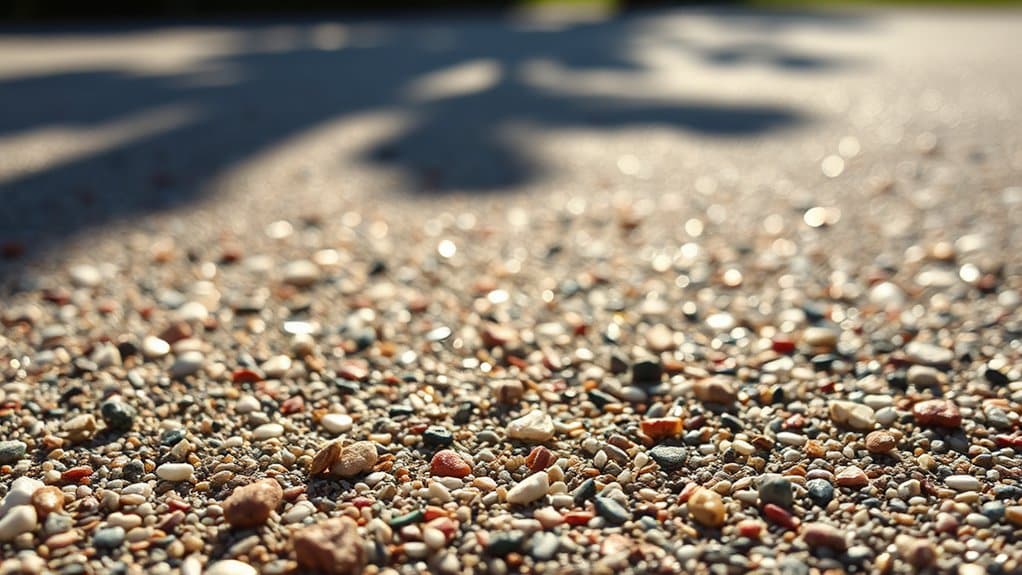
Anti-slip additives play a vital role in resin-bound gravel safety. Fine grit and glass grit mixed into the surface provide essential grip, particularly during wet British weather. These materials prove especially valuable on sloped driveways where slip risks are higher. The additives blend seamlessly with the surface whilst boosting safety. Proper aggregate selection enhances the effectiveness of these additives further by ensuring they lock together effectively. Additionally, their use in conjunction with permeable surfaces helps to manage water runoff efficiently during rainy conditions.
You can incorporate them during installation by mixing them with the resin or add them afterwards as a surface coating. Common application methods include broadcasting or top-layer treatment. Choosing suitable anti-slip materials and proper application creates safer surfaces that look good and perform well – think of it like adding winter tyres to your car for better grip. The right combination means less worry about slipping, whether you're walking to your front door or parking on an incline.
Common Installation Challenges
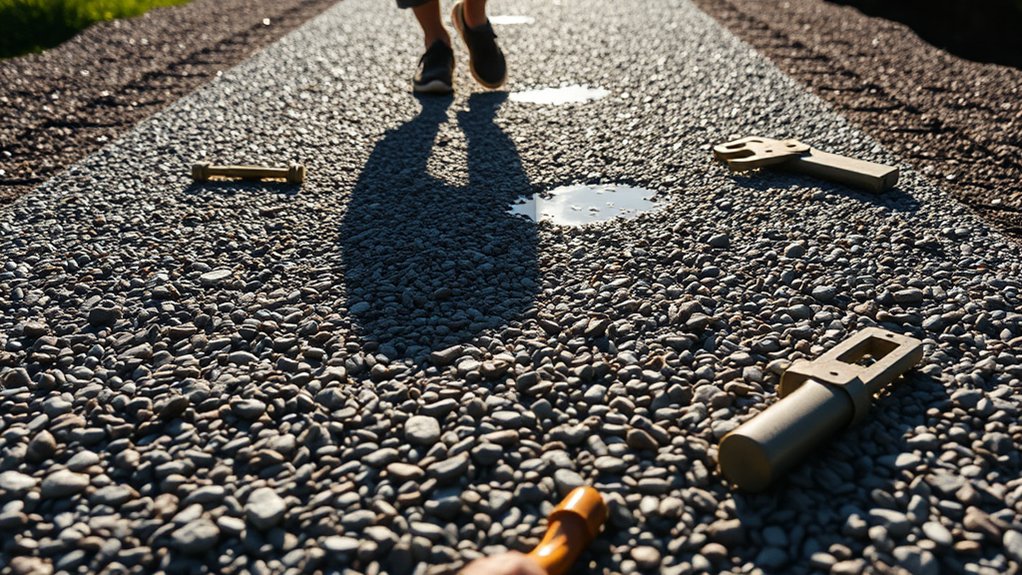
Essential tips for resin-bound gravel installation:
Getting the resin-to-stone mix right is crucial – think of it like baking where the wrong proportions spoil the recipe. Too little resin means loose stones on your driveway, whilst too much creates a sticky mess. The depth matters enormously. A proper 18mm depth for driveways and 15mm for paths ensures your surface won't crack when your car's parked or when the wheelie bins are pulled across. Skimping on depth is a classic DIY mistake that leads to costly repairs. Additionally, proper drainage is essential to avoid issues like puddles and flooding. Ensuring you follow the correct drainage solutions helps mitigate water pooling and potential structural damage. Best to leave this job to the professionals unless you're properly trained. Whilst it might look straightforward, one small error can mean redoing the entire surface.
Expert Installation Necessity
Professional fitting of resin-bound gravel is crucial, as mistakes can cause serious problems later. The groundwork must be spot-on: proper digging, thorough compaction and a solid concrete or tarmac foundation are essential.
You'll need proper drainage and the right sub-base materials – MOT Type 1 aggregate is standard in the UK. The weather matters too; fit only in dry conditions between 5°C and 30°C for the resin to set properly.
Keep materials well-stocked to avoid holdups, and ensure thorough sealing to prevent the surface from lifting. Think of it like laying a carpet – if the floor underneath isn't right, you'll end up with bumps and dips.
Following these steps carefully helps avoid common mistakes and ensures your surface lasts for years.
Ratio Miscalculations Risks
Precise resin-to-aggregate ratios are crucial for resin-bound gravel surfaces. Getting these sums wrong can spell trouble for your installation.
Too little resin means poor stone coverage, leading to loose aggregate and surface breakdown – much like trying to butter too many slices of bread with too little spread.
The sweet spot is a 6% to 8% resin-to-aggregate ratio. Keep this consistent across your project, as patchy mixing creates weak spots and uneven wear.
Whilst using more resin can help prevent stone loss and staining, it's costly and unnecessary if you stick to the recommended ratios.
Following these measurements carefully saves you from expensive fixes down the line.
Think of it like baking – the right mix ensures your surface sets properly and lasts for years.
Ensuring Proper Slip Resistance

Proper slip resistance in resin-bound gravel surfaces starts with choosing the right base. A strong, stable sub-base like open-grade tarmacadam or permeable concrete prevents slipping on uneven ground.
Much like ensuring good grip on a wet pavement, proper drainage is crucial – thorough base preparation stops water from pooling on the surface.
The choice of aggregates matters too. Think of it like choosing trainers with the right tread pattern – you'll want stones of suitable size and texture to provide grip.
Adding UV-stable resins and anti-slip materials such as crushed glass boosts safety further.
Keep the surface safe year-round with regular cleaning and slip-resistance checks, particularly before and after winter.
This approach works particularly well for British weather conditions, where surfaces need to handle everything from summer heat to winter frost.
Importance of Skilled Installation

Professional installation of resin-bound gravel is crucial for safety and longevity. Skilled fitters ensure proper surface grip and overall quality through precise techniques, much like how a properly laid patio prevents wobbling paving stones.
The surface needs a solid foundation – typically tarmac or concrete – as any cracks could cause major problems down the line. Think of it as building a house: without proper foundations, the whole structure becomes unstable.
Getting the mix right is vital. Professional installers know the exact ratios of resin to aggregate, similar to baking where incorrect measurements spoil the end result. They'll select the right stones and ensure thorough mixing for maximum strength.
Proper finishing creates an even surface that's both safe and attractive. DIY attempts often lead to puddles, uneven patches and weak spots – common issues that skilled installers prevent through experience and expertise.
Simply put, professional installation might cost more initially, but it's worth it for a safe, durable surface that meets UK safety requirements and lasts for years.
Maintenance Practices for Safety
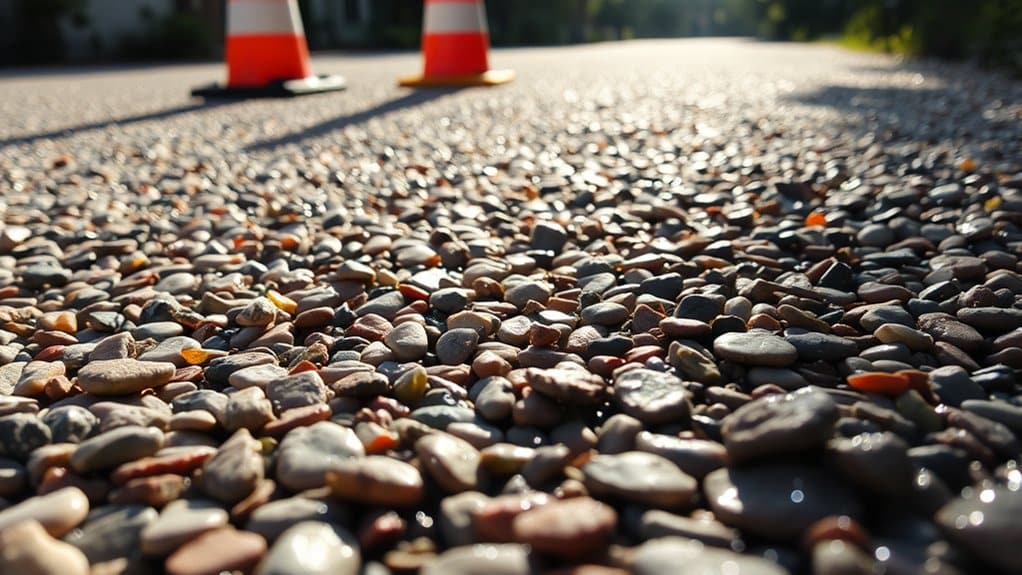
Regular cleaning of resin-bound gravel surfaces is crucial for maintaining grip and visibility.
Check surfaces monthly for wear, loose stones or damage – much like you'd inspect your car tyres.
Tackle any moss or algae growth promptly with appropriate treatments, as these can become particularly slippery during British wet weather.
A quick sweep and occasional pressure wash will keep the surface safe and looking smart.
Regular Cleaning Importance
Regular cleaning of resin-bound gravel surfaces isn't just about appearances – it's crucial for safety and longevity. A proper cleaning schedule prevents dangerous debris build-up and maintains grip, much like keeping your garden path clear in autumn.
Simply sweep with a stiff brush to remove leaves and dirt, then give it a thorough rinse with your garden hose. For those tough marks, like spilt tea or oil, a pressure washer on low setting works brilliantly.
Keep an eye out for unwanted weeds, loose stones and stains – catching these early makes maintenance far easier.
Think of it like caring for your car – regular checks and cleaning prevent bigger problems down the line. This straightforward approach keeps your surface safe, smart-looking and lasting longer.
Surface Inspection Frequency
Surface inspections are vital for keeping resin-bound gravel driveways safe and sturdy. A quick daily glance helps spot minor issues, whilst weekly sweeping keeps the surface clean and highlights potential problems.
Do thorough monthly checks to assess the overall state and safety of your driveway.
Time your maintenance around the British seasons – tackle repairs in spring or autumn when the weather's mild. Look out for ice damage in winter and heat effects in summer. Check for cracks and test drainage by watching how rainwater disperses across the surface.
Always inspect your driveway after storms or particularly harsh weather. Being vigilant with these checks prevents hazards and helps your driveway last longer.
Algae and Moss Control
Algae and moss can make your resin-bound gravel driveway unsafe and unsightly. A few practical steps will keep these problems at bay.
Regular cleaning is crucial – use a pressure washer on a gentle setting to avoid damaging the surface. UK-approved products like Algon or iron sulphate solutions work well to kill unwanted growth. For tough spots, household bleach can help, but always rinse thoroughly afterwards.
Keep the area clear of leaves and debris through regular sweeping to prevent spores from settling.
Apply a moss and algae treatment yearly, ideally in early spring or late autumn when growth is most active.
Sort out any drainage issues promptly, as standing water is a prime breeding ground for both algae and moss, making surfaces dangerously slippery – especially during British winters.
Environmental Benefits of Resin-Bound Gravel

Environmental Benefits of Resin-Bound Gravel
Resin-bound gravel offers vital environmental advantages through its permeable nature and sustainable materials. Much like a natural surface, it works with the environment rather than against it:
- Permeability: Functions like a natural filter, letting rainwater drain through naturally – particularly useful for British gardens and driveways where rainfall is frequent.
- Recycled Content: Contains recycled materials such as glass and plastics from local waste streams, reducing landfill impact whilst maintaining durability.
- Urban Heat Reduction: Light-coloured aggregates reflect sunlight, helping keep urban areas cooler during summer months – similar to how light-coloured paving works in town centres.
- Groundwater Recharge: Supports local water tables by allowing natural drainage, reducing flooding risks common to British neighbourhoods with conventional paving.
Durability and Longevity Considerations
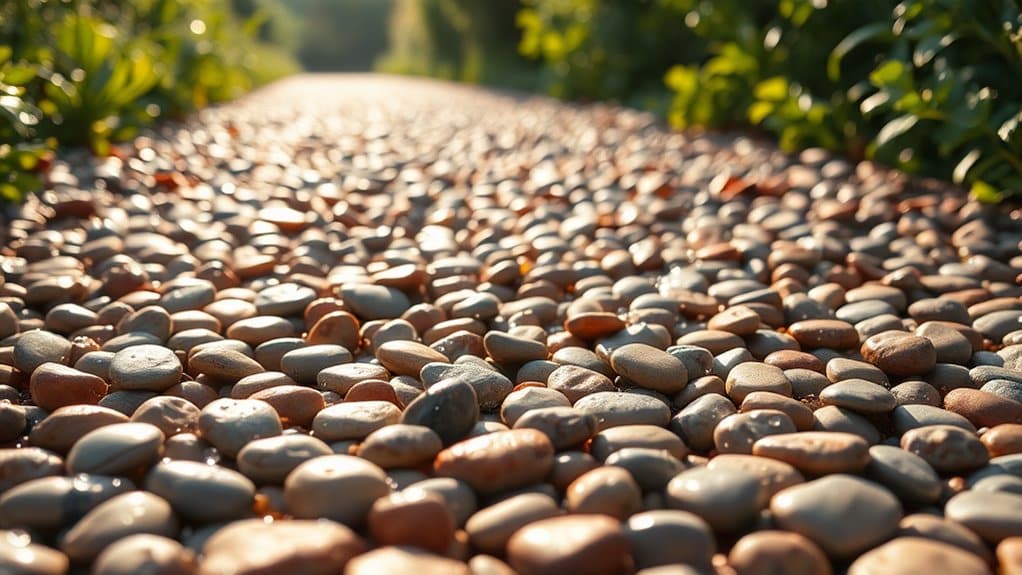
Resin-bound gravel typically lasts 20-30 years with proper care – similar to the lifespan of a quality conservatory.
British weather conditions, from harsh winters to summer heat, can affect the surface, so choosing a UV-stable resin is crucial.
Much like caring for a garden path, regular maintenance keeps the surface in top form. A quick sweep and occasional power wash will help maintain its appearance and structural integrity.
Think of it as you'd a decked area – the more you look after it, the longer it serves you.
Lifespan of Resin-Bound Gravel
The Lifespan of Resin-Bound Gravel
A properly installed resin-bound gravel surface typically lasts 20 to 30 years, making it a worthwhile investment for UK properties.
Four main factors determine its durability:
- Quality of Materials: Premium resin and robust stones, much like those used in motorway surfaces, provide lasting strength.
- Professional Installation: A properly prepared sub-base and correct mixing ratios are crucial – much like building a house on solid foundations.
- Maintenance: Regular brushing and washing, particularly after autumn leaf fall, keeps the surface in top condition.
- Environmental Factors: The surface's permeability handles British weather well, preventing standing water and frost damage.
Weather Resistance Factors
Resin-bound gravel excels in the British climate thanks to its outstanding weather resistance. It handles everything from summer heatwaves to winter frost without deteriorating, making it ideal for our varied weather patterns.
The surface naturally drains rainwater, which is particularly useful during heavy downpours and helps prevent puddles from forming. When winter brings ice and snow, the textured surface provides better grip than many alternatives, reducing slip hazards.
Even under the harsh UV of summer months, the material maintains its structure and appearance. For UK homeowners and businesses, this durability means less maintenance and longer-lasting results, regardless of the season.
Maintenance Impact on Durability
Weather resistance significantly impacts resin-bound gravel durability, but proper maintenance is vital for long-term performance.
Four essential maintenance practices make a real difference:
- Regular Cleaning: Sweep weekly and wash monthly with a garden hose to keep the surface pristine. For tougher stains, a mild soap solution works brilliantly.
- Debris Removal: Clear leaves, twigs and other garden waste straight away – just like you'd with your patio. Left unchecked, these can cause unsightly marks and surface wear.
- Immediate Spill Response: Tackle spills as soon as they happen. Whether it's petrol from the car or red wine from a garden party, quick action prevents lasting damage to the resin.
- Routine Inspections: Check your surface every few months for any cracks or loose stones. Catching small issues early – particularly after harsh weather – saves costly repairs down the line.
Cost Comparison With Alternative Materials

Cost Comparison With Alternative Materials
Resin-bound gravel typically costs more upfront than traditional surfacing options. The combined material and labour costs break down as follows:
| Material | Material Cost (£/m²) | Installation Cost (£/m²) |
|---|---|---|
| Resin-Bound Gravel | 50 | 50 |
| Tarmac | 50 | 40 |
| Concrete | 50 | 45 |
| Gravel | 30 | 30 |
Total project costs for resin-bound surfaces average £120 per m². Professional installation is essential. While the initial outlay exceeds alternatives like tarmac or concrete, the durability and aesthetic appeal often justify the investment over time.
Solutions for Enhancing Slip Resistance
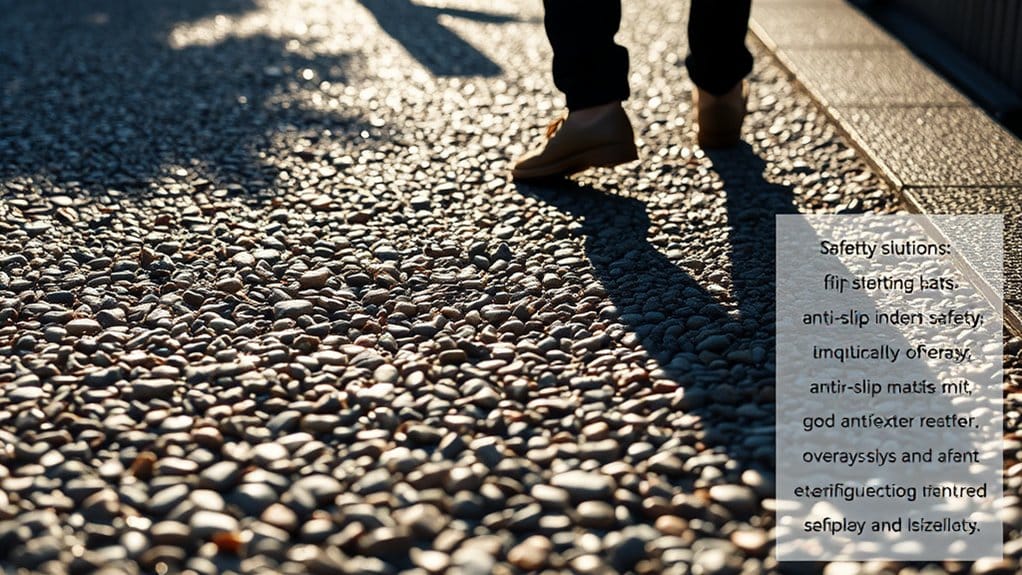
Worried about slippery resin-bound gravel, particularly in our wet British weather? These practical solutions will help:
- Crushed Glass Additives: Mix crushed glass into your resin surface – it's like adding grit to a winter pavement.
- Angular Aggregates: Skip rounded stones and opt for sharp-edged aggregates that offer better grip, much like walking on textured paving.
- Anti-Slip Coatings: Clear anti-slip treatments provide extra grip whilst keeping the surface looking smart.
- Proper Drainage: Good drainage is crucial – think of how a well-sloped garden path stays safer in the rain.
Regular upkeep and these measures make resin-bound surfaces safer year-round.
The right combination of materials and installation methods ensures both safety and style, perfect for British homes and businesses.
Selecting Qualified Installers for Safety
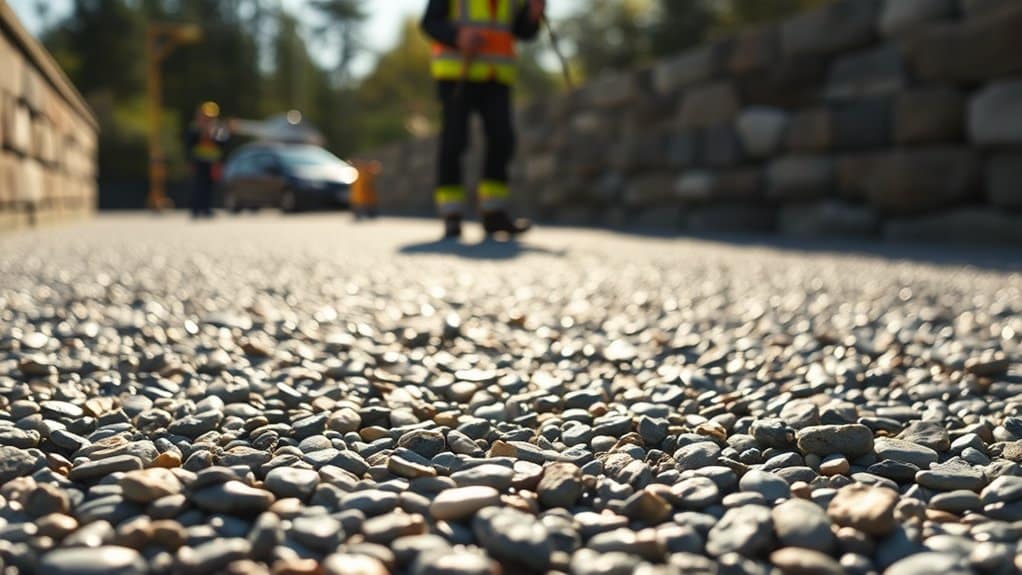
Selecting installers for resin-bound gravel requires careful vetting to ensure safety and longevity, particularly in Britain's wet weather. Check for proper qualifications, safety certifications and hands-on experience with resin systems. Knowledge of Sustainable Urban Drainage Systems (SUDS) compliance is vital for UK installations.
| Criteria | Importance |
|---|---|
| Certifications | Ensures compliance with British standards |
| Experience | Confirms proven installation skills |
| Aggregate Familiarity | Helps choose proper materials |
| Local Regulation Knowledge | Meets UK building regulations |
The installer's track record with local projects can speak volumes – look for examples of their work in your area and ask about their experience with similar installations. A qualified contractor should readily provide proof of insurance, relevant certifications and references from previous clients.
Frequently Asked Questions
How Does Weather Affect the Slip Resistance of Resin-Bound Gravel?
Weather has significant influence on resin-bound gravel's grip levels. Heavy rainfall can temporarily reduce surface traction, much like a wet garden path. During winter, frost and ice may form on the surface, whilst summer heat can slightly soften the resin. Regular sweeping and pressure washing help maintain optimal slip resistance throughout Britain's changeable weather patterns.
Can Resin-Bound Gravel Withstand Extreme Temperature Fluctuations?
Resin-bound gravel performs brilliantly in the UK's varied weather conditions. It copes well with both bitter winter frosts and summer heat waves without cracking or breaking down. Much like a well-built garden path, it handles the freeze-thaw cycle that often damages regular concrete or tarmac. This durability makes it a solid choice for driveways, paths and patios across Britain.
What Precautions Should Be Taken During Installation to Avoid Slipperiness?
Clean and prepare the surface thoroughly before laying resin-bound gravel. Ensure the base is perfectly level and incorporate anti-slip additives or textured finishes during installation. A proper mix ratio and dry weather conditions are essential for optimal grip. For high-traffic areas or slopes, consider using coarser aggregates to boost traction.
Are There Specific Conditions That Increase the Risk of Slipping?
Walking on smooth, wet surfaces without proper drainage is a common cause of slips. Poor surface texture becomes particularly hazardous when combined with British weather conditions like rain, ice or morning frost. Well-maintained walkways with adequate grip and drainage are vital for preventing accidents.
How Often Should Slip Resistance Assessments Be Conducted?
Slip resistance assessments should be carried out every three months in high-risk areas like commercial kitchens, pool decks and busy entrance ways. More frequent checks may be needed during winter months or when surfaces face heavy foot traffic. Review your assessment schedule if you've made changes to flooring or noticed increased incidents of slips and falls.
Conclusion
When properly installed, resin-bound gravel offers good grip in most conditions. The key lies in choosing quality materials and qualified fitters who'll add anti-slip additives to the mix. Poor installation or skipping these additives can make surfaces slippery, particularly in wet weather. If you're planning this surface for your driveway or patio, invest in proper installation from a certified UK contractor – it's worth the extra cost to avoid any safety worries down the line.
